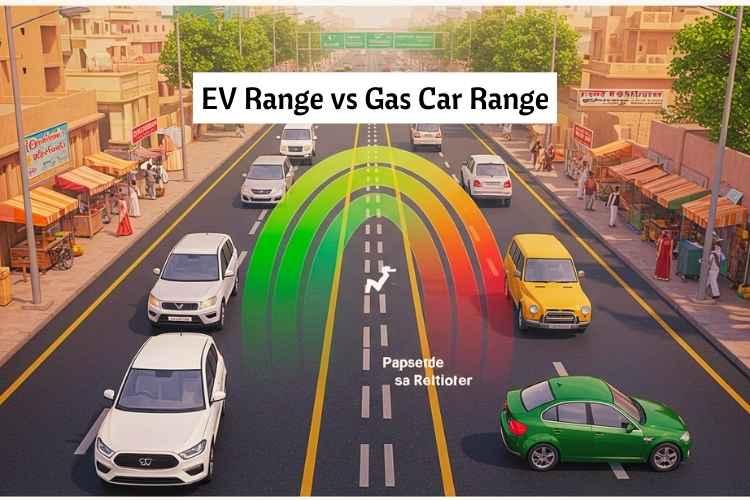EV Range vs Gas Car Range: In India’s fast-changing automotive landscape, one of the hottest debates of 2025 is: “Do electric vehicles (EVS) go as far as petrol or diesel cars?”
It’s a fair question — after all, range anxiety (the fear of running out of battery) has long been a major concern for Indian buyers considering an EV.
Gas-powered cars have ruled Indian roads for decades, with their long ranges and quick refuelling. But today, EVS are evolving fast, with better batteries, more charging stations, and government incentives pushing adoption.

Table of Contents
EV Range vs Gas Car Range: Gas Car Range in India 2025
Traditional petrol and diesel cars are known for long, predictable ranges.
Here’s what the average looks like today:
| Car Type | Average Range per Full Tank | Popular Examples (India) |
|---|---|---|
| Petrol Car | 550–700 km | Maruti Suzuki Swift, Hyundai i20 |
| Diesel Car | 700–900 km | Hyundai Creta Diesel, Tata Harrier Diesel |
EV Range vs Gas Car Range: EV Range in India 2025
EVS in India have come a long way since the days of 100 km ranges. Modern EVS are seriously competitive:
| EV Model | Real-World Range (2025) | Notes |
|---|---|---|
| Tata Nexon EV Long Range | 465–500 km | India’s most popular family EV |
| MG ZS EV (2025 facelift) | 520–550 km | Improved battery tech |
| Hyundai Ioniq 5 | 550–580 km | Premium EV with ultra-fast charging |
| Mahindra XUV400 EV | 400–450 km | Affordable with a solid range |
Key Differences: EV Range vs Gas Car Range
| Feature | Electric Vehicles (EVs) | Petrol/Diesel Cars |
|---|---|---|
| Slightly lower for EVS | 400–580 km | 550–900 km |
| EVS often perform better (regen braking) | 30 min (fast charger) or 8 hr (home) | 5 minutes |
| Range in City Traffic | Slightly lower for EVS | Slightly worse due to idling |
| Range on Highways | Slightly lower for EVs | Optimal performance |
| Fuel/Charge Availability | Growing (but still behind) | Everywhere |
| Cost Per Km (2025) | ₹1–1.5 per km | ₹6–8 per km (petrol); ₹5–6 (diesel) |
| Environmental Impact | Zero emissions | Polluting |
Conclusion on EV Range vs Gas Car Range
If you look at the range numbers, diesel cars still go the farthest.
However, EVS has closed the gap massively, especially premium models that offer 500+ km on a single charge.
👉 For daily city driving, EVS easily match or beat gas cars.
👉 For long highway trips, gas cars are still a little more convenient, but EVS are catching up fast, thanks to better fast-charging stations across India.
In simple words?
- City Users: Go for an EV. It’s cheaper to run, greener, and offers enough range.
- Highway Junkies: Diesel or hybrid might still make more sense for 2025 — but watch out, EVs are coming!
Bhakti Rawat is a Founder & Writer of InsureMyCar360.com. This site Provides You with Information Related To the Best Auto Insurance Updates & comparisons. 🔗
